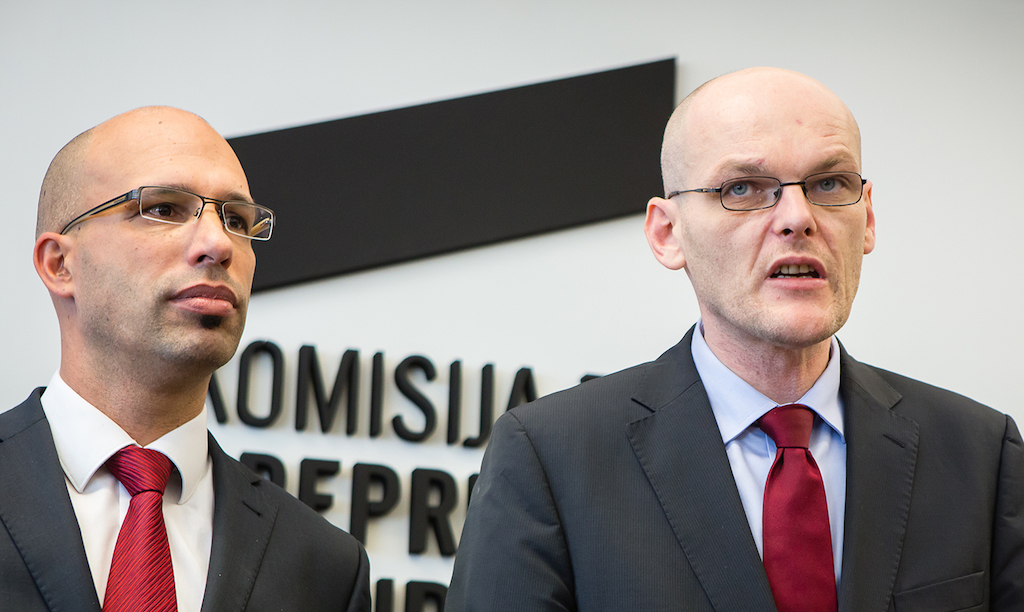The affair concerning the Slovene Intelligence and Security Agency (SOVA) is still a contentious issue. Whether Bojan Bratuša had been one of the informants in the SOVA affair is uncertain, but it is clear that the media game was directed by the Dnevnik newspaper and its then journalist Rok Praprotnik. This has been revealed by Petra Janša in today’s issue of the Demokracija magazine. The SOVA affair was also discussed by Miro Petek in his book ‘V Sovinem gnezdu’ (In the Owl’s Nest – ‘sova’ is a Slovenian word for ‘owl’).
Petek writes: ‘On 20 March 2007, Rok Praprotnik published, on the first and second page, the article “Dolgi politični prsti v bazah podatkov tajne službe. Pod plaščem tajnosti in z vprašljivo pravno podlago je vladna skupina vstopila v prostore Sove in pridobila podatke iz najbolj tajnih registrov.” (Sticky political fingers in the databases of the secret service. Under the cloak of secrecy and on a questionable legal basis, a government group has entered the premises of SOVA and retrieved data from their most classified registers.) None of this had been the case. Lawyers – including Dr Rajko Pirnat and Dr Miro Cerar − later responded in other media that the government group had had a legal basis for monitoring SOVA.
However, the opinions of the lawyers were not published in Dnevnik, but in other media, Petek points out. Instead, on the same day, Dnevnik published on its third page the article ‘Široka pooblastila dopuščajo vpogled v drobovje Sove’(Wide-ranging powers allow insight into the entrails of the ‘owl’), in which Rok Praprotnik claimed that the government ‘group is accessing even the most classified databases of SOVA’, adding that according to his information, this had already happened.
On 30 March 2007, Praprotnik published the text ‘Bivši direktor Sove zavrača očitke’ (Former director of SOVA rejects recriminations), writing that the ‘most recent government interventions concerning the classified databases of SOVA will also be addressed in a special inspection by NATO, which is expected to begin today’. He repeated the falsehood that the government had accessed classified databases, which was followed by an unprecedented manipulation, with Praprotnik claiming that the people at SOVA ‘confirmed the information by stating that, in accordance with the envisaged NATO inspection programme for the protection of classified information, the next regular annual inspection at SOVA is scheduled to happen in the following days’. Petek points out that ‘these words in no way confirm that the government had accessed classified databases or that the NATO inspection would address any interference of the government with regards to classified databases’.
In the text ‘Negativci v ravnotežju’ (Villains in balance) of 29 March 2007, Praprotnik made the following claim: ‘It is now perfectly clear that President of Slovenia Janez Drnovšek is the short-term political target of the SOVA operation.’ Petek points out that, with this thesis, Praprotnik attempted to shift the attention from the controversial purchase of an air ticket for Drnovšek’s healer with money from the illegal fund and point a finger at the bad government that was attacking Drnovšek, who was already quite ill at the time.
History repeated itself during Janša’s second term as the Prime Minister of Slovenia, when Slovenians witnessed the same thing again. Media feuds with SOVA occurred at that time as well, but in the meantime Rok Praprotnik had changed jobs. He had found a new nest. And after a while another one.
In his writing and other controversial operations, Rok Praprotnik had not tried to hide his hostility towards Janez Janša. Together with then President of the Commission for the Prevention of Corruption (KPK) and current Minister of Justice Goran Klemenčič, he had written a notorious incriminating KPK report. Later, Goran Klemenčič and Rok Praprotnik were rewarded for their controversial operations, the former with the position of the Minister of Justice, the latter with employment at NLB as the Director of Compliance Centre. However, KPK in its new composition did scrutinise Praprotnik’s employment at NLB in spring 2014 since it had received several troubling reports regarding this matter. But nothing tragic happened to Praprotnik even though the commission determined that ‘the process of appointing Rok Praprotnik to the position of the Director of Compliance Centre in NLB was not carried out with complete transparency and traceability. However, no violations have been determined in the case of the suspicion of alleged violations concerning conflicts of interest’.
L. S.

